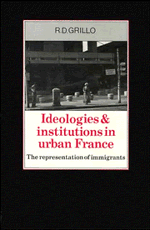Book contents
- Frontmatter
- Contents
- List of tables, figures, and maps
- Acknowledgments
- Glossary of abbreviations and acronymns
- 1 Introduction
- 2 Immigrants in France and in Lyon
- 3 Two modes of discourse: immigrés and étrangers
- 4 Urban development and the problems of housing: the “bachelors”
- 5 Housing and the “problems” of immigrant families
- 6 North African women and the French social services
- 7 In the schools and on the streets
- 8 Language
- 9 Work
- 10 “The strike is like a school”
- 11 The representation of problems and the problem of representation
- 12 Conclusion: institutional and ideological structures
- Appendix: The French school system
- Bibliography
- Maps
- Index
3 - Two modes of discourse: immigrés and étrangers
Published online by Cambridge University Press: 27 August 2009
- Frontmatter
- Contents
- List of tables, figures, and maps
- Acknowledgments
- Glossary of abbreviations and acronymns
- 1 Introduction
- 2 Immigrants in France and in Lyon
- 3 Two modes of discourse: immigrés and étrangers
- 4 Urban development and the problems of housing: the “bachelors”
- 5 Housing and the “problems” of immigrant families
- 6 North African women and the French social services
- 7 In the schools and on the streets
- 8 Language
- 9 Work
- 10 “The strike is like a school”
- 11 The representation of problems and the problem of representation
- 12 Conclusion: institutional and ideological structures
- Appendix: The French school system
- Bibliography
- Maps
- Index
Summary
Deux groupes s'expriment au nom de l'idée radicalement différente qu'ils se font de la patrie. Les slogans criés lors des affrontements de rue, des meetings ou des bagarres universitaires traduisent dans la langage des masses des oppositions longuement mûries ailleurs, les symboles opposent deux systèmes de valeur.
[Rebérioux 1975:22]In this book, immigration provides an extended case study through which to examine the workings of the institutions and ideologies that characterize contemporary France. This chapter explores certain features of the ideological framework. It begins with two meetings. Event I took place at an international hotel in Lyon under the auspices of a club that supported the then president, Valéry Giscard d'Estaing, and was addressed by the minister responsible for immigrant affairs. Event 2 was a meeting of trade unionists held at the Bourse du Travail.
There is a threefold purpose in presenting these meetings and others (Events 3, 4, 5, and 9) in some detail: They illustrate one type of data collected during fieldwork; they enable some of those who became “informants” to be seen speaking directly, as it were, and in context; and they provide abundant evidence for the various ideas that informants held, the topics that exercised them, and the institutions in which they operated. These scenes will also, I hope, convey to the reader part of the complex “reality” with which the fieldworker is confronted and which analysis works over in a more discursive way.
- Type
- Chapter
- Information
- Ideologies and Institutions in Urban FranceThe Representation of Immigrants, pp. 51 - 83Publisher: Cambridge University PressPrint publication year: 1985

